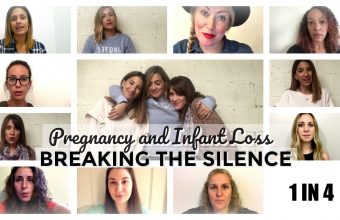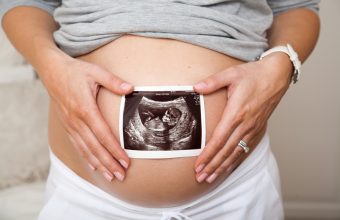I am on the phone with a fertility clinic, groveling with the reception to get an earlier appointment date. Unfortunately, I don’t succeed and must create a whole new countdown to my first meeting with a top fertility specialist.
A countdown I never thought I would have to face.
Since I was a little girl, I wanted to be a mom. However, life took a different turn, and when I hit my late twenties, I found myself picking up the pieces of my personal and professional life after going through a broken engagement and leaving a new job after only three months. I remember feeling hopeless – as though I had lost control of my life. Slowly, I rebuilt my inner strength, focused on finding a job I would enjoy and regained my faith in love. Over two years later at the age of 29, I met my husband. From our first date, I had that cheesy realization that he was the one, and 14 months after we met, we were engaged. 12 months after our engagement, we had officially become husband and wife at our dream wedding. I thought the time of waiting for my big milestones in life to happen was done.
Over a year after our wedding, my husband and I began to get serious about expanding our family. Naively, I assumed getting pregnant would be the easiest journey for us. I was fortunate to be in good health throughout my life and always remained active. I wasn’t a big drinker. My husband matched me in good health, and my mother got pregnant three times and had my sister, brother and myself with ease.
I had no reason to think it wouldn’t be easy.
Unfortunately, our initial efforts to conceive in our first year of trying were met with several disappointments and then was delayed by the tragic passing of my father-in-law and the emotional turmoil that came with it. After a period of grieving, my husband and I resumed trying to expand our family in June 2017. For the first few cycles, I tried to have fun with it, but secretly, I was diligently tracking my ovulation cycles every time and was going crazy comparing the results of the three TTC (trying to conceive) apps I had on my iPhone. My determination seemed to pay off, as I became pregnant in early September 2017. When I told my husband the news, he beamed with joy and we spent the whole night embracing and celebrating.
After waiting for 12 weeks, we headed to our first appointment with my OB. I smiled hugely during the entire car ride and as I waited to see the doctor, my husband and I talked about taking pre-natal classes and things we wanted to do over the next few months to prepare for our May 2018 baby. We met with my OB and she enthusiastically got ready to perform my first ultrasound. After she put the wand on my abdomen and moved it around for a few minutes, I noticed her face go from smiling to serious. She started explaining that the fetal sac looked a lot smaller than it should be and asked my permission to do an internal ultrasound. I said yes with a sense of dread, as I had a feeling I knew what was coming next.
After a closer look, my OB broke the news to us – our baby passed away at 8 weeks and that I had suffered a missed miscarriage. A missed miscarriage occurs when a fetus dies, but the body does not recognize the pregnancy loss. As a result, I went on for the last four weeks of this pregnancy, feeling pregnant and experiencing all the classic first trimester symptoms. As my OB continued to speak, I found myself going deaf and just staring into space. I could see my husband asking tons of questions and my doctor answering, but I couldn’t hear a word that either of them was saying. My OB left the room to give us privacy and once the door closed, I broke down into tears and fell into my husband’s arms. I cried as I went out to the reception to book my D&C procedure for the next day to surgically complete my miscarriage. I woke up in the middle of the night to cry, as my husband held me. I felt hopeless – the same feeling I felt when I was in my late 20s.
Six weeks after my first D&C, I was back to being determined and positive about our path to parenthood.
After ringing in 2018 and getting back into the work grind in January, I was hit with unusual fatigue and nausea. At first, I thought it was because I went from having two weeks off back to full-fledged work mode, but to my surprise, this wasn’t the case. My husband suggested I take a pregnancy test and to our delight, the test was positive. My eyes filled up with happy tears and like we were in September, we were so excited. My fears were settled and I felt it was our rainbow year.
For this pregnancy, my OB wasn’t taking any chances. She set me up with the hospital’s early pregnancy unit – a unit that most hospitals have – for consistent monitoring during my first trimester. This put me at ease, as I would have bi-weekly ultrasounds and blood work and would know what was happening on a regular basis. Starting at four weeks, I began this process, and all appeared well. My blood work showed that my numbers were great and at six weeks, I had an ultrasound and saw my baby’s strong heartbeat for the first time. I came in again at eight weeks and experienced the same thing – I saw my baby’s heart flickering away at eight weeks.
A couple of weeks later, my OB called me back in for another routine ultrasound and immediately after putting that wand back on my stomach, she began taking measurements and told me that the fetus stopped growing between 8 and 9 weeks and the heartbeat had stopped.
Just like that, another pregnancy of mine had ended.
I was shocked. Instantly, I requested to have a second D&C as I wanted it over quickly and told my doctor that I needed help. I wasn’t going to recover, have my period return and roll the dice on conceiving again without fertility assistance. I felt I deserved more and better than this. Without hesitation, my OB referred me to a fertility clinic. She was very supportive and told me not to lose hope.
On the day of my second D&C, I tried to have a positive outlook. As I breathed in oxygen through a mask and drifted off, I pictured my future rainbow baby with the same brown eyes and dark hair as my husband and I both have and fell asleep under the bright operating room lights.
As someone who has had recurrent miscarriages, I have learned so much from others who have gone through this and have witnessed how hard it can be for people who are your greatest supporters.
Through my experience dealing with recurrent miscarriages, here are a few thoughts that I can share:
If you are comfortable with it, embrace your fertility struggle and share. As a person who is slightly shy in nature, at first, I questioned whether it was a good idea to be open about my fertility struggles. However, being open has connected me to many amazing women who are on the same path and has helped me to forge a great support system. However, if you wish to keep the matter private, there is no shame in that either. It is all about your own comfort level.
Even if you haven’t experienced it yourself, you can play a large role in helping others going through fertility issues. If you have friends or family members who are struggling with fertility, be there to listen when they’re feeling down and needing to vent, show them love as they go through treatments or are waiting for test results, and provide support that they need at the moment. Don’t focus too much on your friend’s future dream baby or family. Focus on the current.
Take the time to grieve – for both you and your partner. I admit that after my first miscarriage, I was so preoccupied with my own sadness that I didn’t keep in mind how my husband was feeling. Always remember that your partner is just as affected as you. They might not have gone through a physical pregnancy loss, but it was their baby too. Take the time to grieve properly, don’t rush the process, and make sure you check in regularly with your partner. Have all your talks and moments together that you need to get through it. Believe me, it will help to build more strength in your relationship. It certainly did that for my husband and I.
Set yourself up to feel confident about your fertility care. If you require fertility help, make sure you take the time to find the right medical professionals for the job – both in skill and bedside manner. It is important to feel that you jive with your entire medical team, that you can trust them and that you want them to be a part of your journey. If you don’t feel good about your fertility team, it is never harmful to switch.
Just do you for a while. Take time to focus on yourself, what you need to do to heal (both physically and emotionally), and what will get you to a place of positivity and happiness again. Try new things, partake in activities and experiences that you are interested in, take that trip you have been talking about for a while. Don’t shut out the world, but take more time to feel good, be happy and do things that you need and want to feel better.
Remember that you are not alone and try not to lose hope, as hard as it is. Miscarriage and pregnancy loss is extremely difficult. It catches us by surprise and can shake us to our core. It is shocking and hard to accept. During this time, please remember that many women have experienced this and as corny as this sounds, we are all in this together – to gain strength for ourselves and to support one another. Also, hold on tight to hope. Hope can be great medicine.
As I wait for my first appointment with my new fertility doctor, I hold tightly onto my own hope. I picture the many conceptions and due dates of my angel babies, and I picture rainbows. All I can do now is keep building up my strength and hold on tight to hope.
That’s all any of us can do, really.
Tagged under: fertility,miscarriage,dealing with miscarriage,advice for miscarriage
Category: mom-101






